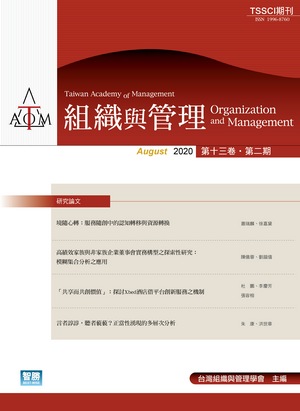Hot News
| 中文篇名 |
境隨心轉:服務隨創中的認知轉移與資源轉換 | |
|---|---|---|
| 英文篇名 |
On Second Thought: Cognitive Shift and Resource Conversion within Service Bricolage | |
| 作者 | ||
| 中文摘要 |
資源有限時企業何以創新?劣勢創新文獻認為,重新拼湊稀少資源或是以象徵性行動取得合法性,便能隨手拈來皆是創意。前者的邏輯是以少為多,重組手邊資源;後者的邏輯則是無中生有,借力他人資源。目前研究雖探討到少資源與無資源的議題,兩者卻皆未觸及劣資源的狀況。若行動者手邊僅有劣質資源,又面臨制約時,如何方能發展解決方案?這是當前理論面臨的瓶頸,也是實務遭遇的挑戰。要突破此議題,需由認知轉移與資源轉換著手,從「轉念」理解行動者何以解讀制約與巧用資源。本研究分析星野集團如何翻轉日本奧入瀨溪流(Orase-keiryu)酒店,探索該公司如何轉變對制約的認知,繼而轉換看似不佳的資源,重新組合出新服務。學理上,本研究延伸隨創理論,點出制約相對性與資源二元性兩項新觀念,分析行動者如何以相對性思維來解讀制約,促成認知轉移而找出扭轉契機,及以文化特性重新形塑資源的性質,發展出創意的服務。實務上,本研究拓展隨創的作法,點出行動者遇困境時若能以轉念重新定義制約,便可使阻力轉為助力;藉由文化可塑性改變資源性質,進而轉變資源價值。如此,企業便無需囿限於困境之中,而能在制約中察覺機會、轉換劣資源,並促成深具魅力的服務。 | |
| 英文摘要 |
How may we innovate with limited resources? The literature of adversary innovation suggests that making-do of scare resources, or using symbolic action to build legitimacy, could improvise creative resolutions. “Less is more” is the logic of the former, by recombining handy resources; and the latter assumes another logic of “creating something from nothing”, by leveraging the resources of others. However, the current research has explored the issue of resource scarcity and resource deficiency, but neither of them has touched the matter of “inferior resources”. If social actors only behold inferior resources, how they may develop solutions from various constraints. This is a theoretical bottleneck as well as a practical challenge. To attempt a breakthrough of this issue, our investigation commences with social actors’ cognitive shift, to understand how they interpret constraints and make creative use of resources. This research analyzes how Hoshino Group turnarounds Orase-keiryu Resort in Japan and explores how the team transforms their cognitive understanding of constraints, while converting seemingly unpromising resources, thereby recombining them to develop new services. Theoretically, this research extends the theory of bricolage and recapitulates two new concepts: the relativity of constraint and the duality of resource. This article explains how social actors translate constraints that induces cognitive shift so as to identify opportunities and reshapes cultural characteristics of resources, further developing creative services. Practically, the analysis also expands the practice of bricolage, and points out that, once social actors could shift to a “second thought”, by means of relativity cognition and resource conversion, they could develop a new understanding of constraints while turning resistance into assistance; and as social actors apprehend the cultural elasticity of resources, they could convert resources’ nature and transform their value. As such, enterprises need not to restrict themselves pessimistically and may discover opportunities out of frustration, while transforming inferior resources into charming services. | |
| 關鍵詞 |
劣勢創新、相對性思維、資源二元性、資源轉換、隨創、adversary innovation、duality、resource conversion、relativity cogitation、bricolage | |
| 刊名 | ||
| 期數 | ||
| 起訖頁 |
001-051 | |
| 出版單位 | ||
| DOI | ||
| QRCode |
| |
| 下一篇 |



